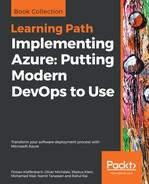When you create an App Service, such as a Web App for example, you will be asked to specify the App Service plan.
An App Service plan is like the hardware host on which you run your VMs. It contains the resources that are shared among the App Service. As a result, we can look at App Service as VMs running on the host, which is the App Service plan.
The App Service plan also defines many settings for the App Service that will be built on it, such as the region, number of instances, whether it will be able to scale out/in or not, and much more, which will be covered later on.
Azure offers different plans to fulfill different customers' needs, such as the following:
- Shared infrastructure plans:
- Free plan: This is the entry level plan, and as its name implies, it's available for free. It's meant for dev/test scenarios, or if you wish to deploy a website for temporary purposes, where your app would be running with other apps on the same VM with a limited CPU quota per day and no SLA guarantee. This option is suitable, as long as you don't care about your domain name.
- Shared plan: This plan is also meant for dev/test scenarios, but offers a higher CPU quota than the free plan, and the ability to add a custom domain name to the app. This is the lowest cost plan.
- Dedicated infrastructure plans:
- Basic plan: Although this plan is meant for dev/test scenarios, it can also be considered as the entry level for a small business. Also, it provides a dedicated VM with an OS (Windows/Linux) of your choice on which the apps will be run, greater hardware resources for your apps, the ability to add SSL certificates to secure your apps, and manual scaling up to three instances. Unlike the shared plans, it offers a 99.95% SLA.
- Standard plan: This plan offers more resources than the previous plans. It also offers autoscaling, deployment slots, distribution of traffic using Traffic Manager, and daily backups.
- Premium plan: This plan offers even more advanced hardware resources, more deployment slots than the standard plans, and more instances when it comes to scalability. There's the Premium plan and Premium V2 plan. The advantage of the Premium V2 plan is that it runs on a Dv2 series VM.
- Isolated infrastructure plan: This plan offers an isolated hosting environment that is located in its own virtual networks and virtual machines. Like the Premium V2 plan, it is based on the Dv2 virtual machine series. It offers the other features available with similar level plans, but with higher specifications.
Deployment slots provide the ability to develop and test your app without affecting the production environment. Whenever you want to swap the dev/test environment with the production one, you can do it with one click, without causing any downtime. Also, if you find something wrong with the new release of your application, you can roll back by swapping to the slot that used to run the production before.
